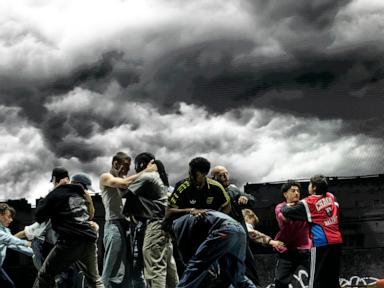Farmers and ranchers have protected and cared for the land, environment and wildlife long before it was trendy or politically expedient. They have faithfully been stewards of our land for generations and have done this because the land that gives so generously to them deserves and demands respect. Farmers and ranchers are connected to the land, paying close attention to shifts in weather, nature, production, species, and the habitability of their spaces.
They have always been the most in-tune conservationists. The average farmer and rancher meticulously notes their management actions to ensure that they have a positive impact on the environment. Their unwavering commitment to preserving the planet is truly remarkable.

For generations, they have been following the guidelines left for them by Mother Nature. Conservation has been a byproduct of Colorado ranching for centuries. In the U.
S., over 90% of beef farms and ranches are family-owned and operated. These family operations have not only preserved the environment but helped to encourage the future bounty of the land.
Cattle grazing specifically helps sustain grasslands, create sanctuaries for wildlife and native vegetation all the while utilizing a forage source that is not available for traditional cropland. Through the managed grazing process, grasses are reseeded, forage root masses are increased, and the soil is aerated through the cattle lifecycle. Cattle are in a constant state of refurbishment of the land, as they walk and graze while being rotated by the rancher in a way that stimulates the ground and seeds.
Through rotational grazing, cattle ranchers have mastered the cycles of the grasses. They know when to apply more impact and when to take it away to stimulate the regrowth of grasses and forbs. Rotational grazing also supports the soils and plants ability to store carbon, instead of releasing it into our environment.
Farmers and ranchers are stewards of the land and masters of its continued preservation. They have become expert observers — through time, tradition, experience, science, monitoring, adaption and constant care. Aside from cattle grazing, the preservation of land alone helps contribute to an ecofriendly environment.
Without farmers and ranchers owning land, so much of our country’s beautiful landscape would be developed into concrete jungles that don’t serve our ecosystem. The farmers and ranchers take care of the vital space that protects our country’s natural resources. In the United States alone, farms and ranches make up almost 40% of the nation’s land.
This ensures the conservation of just under half of the country’s land mass, while simultaneously feeding the world. Water is one of the scarcest resources in the agriculture industry. The Colorado beef farmer and rancher has been preserving this water system naturally for centuries.
For beef farmers and ranchers, choosing whether to conserve water is not an option — it is simply a fact. According to a national survey of beef farmers and ranchers across the U.S.
, 99.8% of them say that they implement at least one, if not more, water quality improvement practices in their operations. These are practices such as reclaiming, filtering, and reusing water, protecting waterways and streams for wildlife, increasing aeration in manure-holding lagoons, and more.
Additionally, the water that farmers and ranchers use to irrigate also percolates into underground aquifers, runs into streams, and contributes to ponds, lakes and late season streamflows. The most important thing for America’s farmers and ranchers is the care of the animals they raise. To provide the best product for consumers, the beef industry uses many resources and tools, like the Beef Quality Assurance program, to help facilitate industry success.
Many of these programs operate through the Beef Checkoff program. This initiative offers programs that train farmers and ranchers on best practices to produce healthy, safe, high-quality, and high-value beef. In the U.
S., 85% of beef that is raised and sold comes from a BQA-certified farm or ranch. But sustainability in the beef industry reaches much farther than environmental practices and reduction initiatives.
In Colorado, sustainability embodies responsibility, reliability, and consistency. For our state, cattle production is as intrinsic as the Rocky Mountains or the sprawling grass plains. Ranching is etched in our history and woven into our identity.
The cattle industry has done more than just conserve land and produce food. It has created community and supplied the economy. The livestock industry alone has an over $5.
7 billion annual impact on the state’s economy. From jobs to consumer goods to heart-healthy beef, farmers and ranchers and their families are a vital part of our history, and the fabric of our economy today. Since the beginning, the beef industry has fostered a sense of community in Colorado.
For each job or product that it supplies, there are people impacted. From meat processing and feedlots, to the state’s rich rodeo cowboy history, FFA and 4-H youth programs, and more, the impact of Colorado farming and ranching is everywhere. Regardless of the regulations or restrictions that are placed on it, the industry has an obligation to the state.
This is shown in its dedication to growing a trustworthy product, to sustaining the environment and creating stable jobs and communities for Coloradans across the state. The way of life of the Colorado rancher is a story of grit, gratitude and determination. It is not a life for the faint of heart.
But it is a story that has withstood the test of time and hardship, because it is essential to our health and survival. Despite the challenges we face, farmers and ranchers will continue to pursue their legacy. To keep the beef industry alive and feeding the world, it must continue to promote and sustain itself.
The industry cannot do that without an organized initiative to promote itself. This is where state beef councils come in. The Colorado Beef Council works to ensure the future of the industry and help drive consumer satisfaction.
The Colorado Beef Council is not here to impact political plays or corporate schemes, but to promote the simplicity and dependability of beef. State beef councils are an essential part of the beef industry, especially here in Colorado. Their sole purpose is to work as a liaison between the consumer and the producer, facilitating the research and development that the Beef Checkoff does in order to educate consumers on the benefits of beef.
Additionally, the Colorado Beef Council works to create a connection between ranchers and consumers. The more exposure the consumer has to ranchers and their operations, the more confidence they can have that ranchers care for their animals. At the end of the day, farmers and ranchers exist to serve their land, their animals and their communities.
This is their heart and their soul. They do their jobs every day to feed the world. The more exposure the consumer has to the heart of the American farmer and rancher, the more they support and invest in the industry.
Sustainability and farming and ranching are far from mutually exclusive, especially in Colorado. Sustainability as we know it cannot exist without the farmers and ranchers who facilitate research, innovation, and preservation. Farming and ranching families are the backbone of our food supply chain, working tirelessly to take care of the land while ensuring that everyone has access to healthy and nutritious food.
Their hard work and dedication are essential to feeding the world, and we owe them our gratitude and support. So, next time you see the brim of a cowboy hat in Colorado, know that the cowboy or cowgirl underneath is working nights, weekends, and holidays to protect the natural landscapes of our state, and providing food security for all. Robbie LeValley is a rancher from Hotchkiss and has been in the industry for over 50 years.
She sits on the Board of Directors for the Colorado Beef Council and has been a member of Colorado Parks and Wildlife Habitat Partnership State Council for more than 20 years. LeValley is a part of a multigenerational cattle ranching and food production family that has helped to drive the industry forward in the state..



















